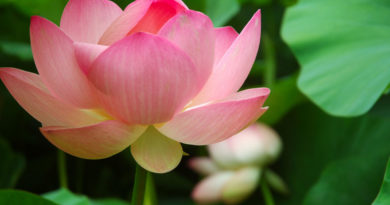DHAMMA RATANA – CHAPTER 16: THE SUBLIME HAPPINESS
DHAMMA RATANA – CHAPTER 16: THE SUBLIME HAPPINESS
The Sublime Happiness
8.10.95
Today’s sermon will be on the “Sitibhava Sutta“. ‘Sitibhabva’ means the sublime happiness or nibbana + “sutta” means explanation. In this Sutta the Buddha explained the six factors for the attainment of the sublime happiness or nirvana. When ever meritorious deeds are performed you always wish for the sublime happiness of nirvana.
The 6 factors are:
(I) To control the over excited mind
(2) To encourage when the mind is oppressed
(3) To be joyful when necessary
(4) To be indifferent when necessary
(5)To develop inclination towards the noble magga and phala
(6) To delight in the sublime happiness of nibbana
(1) To control the over-excited mind.
When the mind is scattered and restless, it should be calmed down. A yogi with a limited time (15 days leave) to practise vipassana meditation is likely to be over excited for the attainment of dhamma and becomes restless both physically and mentally. While sitting to meditate he is tense; his body is more stiff and erect than it should be; he holds up his head higher than necessary. His conscious mind is also over zealous so that he will not miss to note whatever manifests. As he wants to gain dhamma in a short time, he becomes over anxious and put more effort. However in such a mental state the attainment of dhamma is impossible.
The Athakatha masters advised briefly to control the restless mind by strengthening concentration. It is difficult to control the mind. Moreover it cannot be done by any means other than the Buddha’s advice. That is the reason why the Lord has frequently preached on how to control the mind. Other methods will cause the mind to be more scattered. The mind is free to delight in anything of its own accord. However if the mind is tamed and cultured, it can lead you to magga and phala.
Mind is so swift and changeable that it is happy in this moment but not in the next, it is pleasant now, but not the next moment. It is not easy to subdue mind, hence it dwells on any sense objects it likes. The mature meditators are well aware of the nature of mind. The sense objects it chooses to settle upon are mostly unwholesome ones, though the practising yogi would like to let their minds dwell upon rupa and nama. That is the nature of the mind but not that of the individuals. Since your childhood, you have been under guidance of good parents and teachers, and therefore you have a proper control over your mind.
You should not let the mind have its own way; it must be well controlled , subdued and cultured. So that it will take you to magga and phala and nibbana. Rev: Mahasi Sayadaw has composed the following verse for the meditators , in order that they may be able to tame their mind and practise ardently.
Motto: Hard to restrain, swift and wandering,
This harsh, fierce consciousness goes roving
It becomes mild, subtle and gives us happiness
It is necessary to restrain the mind when it scatters. It is the duty of the experienced yogis to guide the new comers. Will you say, “I don’t know, how to guide them, though I’ve heard about it”. When noting does not settle on the arising sense object, in other words, if a yogi cannot note exactly what is happening at the present moment, then mind becomes restless. Yogi may reflect thus, “My contemplation was quite alright before. Will I gain dhamma during the rest of my leave? Only a few day is left” and so on. He was thinking of what has happened in the past and also what will happen in the future, however not what is happening in the present. Thereupon yogi should be instructed to note the present and not the past nor the future. How?
It is to note the restless mind as “restless” “restless”, since the restless mind also is a sense object to be noted. When yogi’s noting mind can keep pace with the restless mind, after a certain length of time, mind will no longer scatter, because it is noted spontaneously whenever it becomes restless Noting therefore, has overcome the restless mind.
Will the experienced yogi say, there is no way to control the restless mind, when the new yogi told them that they could not control their mind by noting “restless”, “restless”, “thinking”, “thinking”. I am sure, you all would guide them by saying, “Relax physically and mentally by pondering. I may or may no gain dhamma. Nevertheless I must try noting. Then you will be less tense and can note what is happening in the present. Thus your concentration will be strengthened.” If the mind is too restless and scattered, it is better for a yogi to develop the three factors of enlightenment, namely equanimity, concentration and tranquility.
Motto: Develop equanimity, concentration and tranquility,
the three factors of enlightenment
whenever there is over-excitement.
Equanimity (Upekkha) factor of enlightenment means to view things neutrally whether wholesome or unwholesome. The desire for pleasantness is the cause of restlessness. Whether it is pleasant or unpleasant, you note it as it is. In other words, if it is pleasant just note “pleasant”; on the other hand when it is unpleasant just note “unpleasant” instead of developing greed or anxiety. That means yogi is not influenced by pleasantness or unpleasantness, he is indifferent to them. Then equanimity is developed and noting will be well balanced. Thus the scattered mind is put under control.
“I am going to note whatever manifests at the present moment”, this way of reflection is the cause of concentration; thence you gain concentration when you contemplate incessantly. Note the sense objects of the present not letting the mind wander to the past nor the future. That means mind is fixed on the present manifestation. Thus the factor of enlightenment namely concentration is developed.
Motto: Reflect not upon the by-gone past nor expect the new future
Note the present becoming and dissolution of nama and rupa for sure.
Do not think of whatsoever has happened in the past whether it is good or bad. And also do not expect for the future, such as whether dhamma will progress or not. The future is not here and therefore nothing has happened yet, nor concentration develops. Just fix your mind precisely on the present happening.
With physical and mental worries and anxieties, will you gain dhamma? You worry whether dhamma will progress; you are also anxious to gain dhamma and ponder; “It is doing alright now; will it be so in the coming days?” Thus your mind has no tranquility (passadhi) whereupon it becomes restless and diffused. You may also worry whether you will be able to report to the instructor at the dhamma discussion. All these are the causes for the scattering mind. Relax physically and mentally then only there will be tranquility and calmness in your mind. Concentration develops when there is tranquility in your mind.
2. Encourage the mind when it is oppressed
At some stages of insight yogi may lose interest in meditation and become less energetic. Thereupon he should be encouraged to reflect wisely. The Athakatha masters advised to exert more as a protection from lethargy. At the beginning yogi is quite satisfied with his practice, however in the later stages, he becomes wearisome and wants to go home. He may also think that it was a mistake to come to the meditation centre, since he could not find any substantial benefit of meditation. A yogi experiencing the lethargic state of mind should be instructed to exert more and to contemplate. How will you go about it’?
“Don’t go home . Just listen to me, follow what I have told you”. Certainly you will not do that. At the start yogi notes, ” rising” “falling” i.e. 2 sections noting. When there is no progress in dhamma, he is advised to note 3 sections such as “rising” “falling” and “sitting”. If not improved then note 4 sections, such as “rising” “falling” “sitting” and “touching”. Even if the 4 sections noting could not help yogi, then advise him to note 5 sections as follow: “rising” “falling” “touching by right foot”, “rising” “falling” “touching by left foot, “rising” “falling” “touching by the right buttock”, “rising” “falling” “touching by the left buttock,” “rising” “falling” touching of hands”. Even then if yogi still feels weary and lacks in concentration , the Athakatha masters advised to develop the three factors of enlightenment, such as energy, rapture and investigation of dhamma.
Motto: Develop energy, rapture and investigation, The three factors of enlightenment
When there is lack in dhamma improvement
In order to develop energy, one should recollect the reality of sufferings in hell thus, “If dhamma is not gained in the present life, the chance to return to hell is inevitable. I must exert more effort. If I go home and don’t meditate, I shall not gain dhamma in the subsequent existences: Thus to suffer in hell is a certainty”. The Buddha also preached, “Don’t miss the grand opportunity of being a human being in the presence of the Buddha’s Sasana. One who fails to grasp this golden opportunity will suffer in hell and will repetitively experience worries and anxieties of such unhappiness. Though fortunate enough to encounter with the Buddha’s Sasana in this very life, if you have not practised insight meditation, you will suffer in hell and always worry and repent”. Upon lucid realization of sufferings in hell, yogi will put more effort and then he is less oppressed. Thus the factor of enlightenment, energy, will be developed.
Two pedlars
At one time when the Buddha was residing at Zetavan Monastery, Savatthi, a monk came back from the forest, where he practised dhamma with no result. He just spent time by seeing the Lord and listening to His dhamma. The other monks asked him whether he has gained any dhamma whereupon the answer was in negative. The monks brought him to the Lord and reported the situation.
“Oh monk, if you lacked in exertion and failed to gain dhamma in this present life, you might become melancholic and despondent for many worlds to come just like the paddler who missed a golden cup worth a million”, admonished the Buddha. Upon hearing this, all the monks respectfully requested the Lord to relate to them about the pedlar.
In one of his past existences Buddha-would-be was a pedlar. One day he went out on a business journey and met another pedlar who was full of avarice. They made an agreement not to cross each other routes. The greedy pedlar went around announcing, “pretty wares, pretty wares”. By and by he approached a house where an old grandmother and a grand daughter were living. On hearing the pedlar the girl asked the grandmother to call the pedlar and to buy some pretty things for her. The old woman replied,” Since we have to work as house maids, how can we buy such costly things”. The old woman and the girl were once well-to-do people, however now their economics were in ruin. The young girl told her grandmother that there was an old cup among the heap of broken pots and pans since her grandfather’s day and that the cup may be bartered with a necklace.
The greedy pedlar was called in and shown the old cup and they told him to take it in exchange for a suitable necklace. The pedlar scratched the cup and at once knew that it was a cup of gold. On his second thought he would like to take it for nothing. Thereupon he threw it on the ground saying “It is not worth even two pyas” and left the house.
Soon after the Buddha-would-be pedlar came near the house shouting, “pretty things to wear”. The young girl again entreated her grandmother to barter a necklace for her with that old cup. The old woman said, “The previous pedlar has told us that the cup is not worth 2 pyas”. The girl reasoned with her grandmother that the previous pedlar seemed to be greedy and conceited, while the present one seemed to be honest and soft – spoken and may be he would agree to barter the cup with a pretty necklace. The Buddha-would-be pedlar came in and examined the old cup and then from the scratch he found it was a golden cup. He honestly told the old lady, “Oh! Mother, this is a cup of gold and it is worth a million. Surely, I have no wares worth that much”. The old lady said, “Oh! Pedlar, the other one has told us that it was not worth even two pyas. May be the cup turns into gold due to your fortune. We give you this old cup in exchange for a suitable necklace for your young sister”.
Then the Buddha-would-be gave them 500 in money which was the proceeding from the sale as well as all the remaining pretty wares worth 500. He retained only his bag, a weighing balance and only eight coins in money for the boat fare to cross the river. Then he hurried to the river hank, gave the fare to the boatman and crossed the river.
Not long after, the wicked pedlar came back to the old woman’s house and told them that he would take the old cup in exchange for some pretty wares. The ladies chided him of being dishonest and told him all about what the Buddha-would-be pedlar had given them in exchange for the old cup. At these words the greedy, wicked pedlar realized with great pain and suffering that he had lost the golden cup of million worth. Losing his senses, he flung away everything together with the wares at the door of the old woman and the girl. He also stripped his clothes into rag in anger and left for the river bank with a rod from his weighing balance to kill the Buddha-would-be paddler. Arriving at the river bank, he saw the Buddha-would-be pedlar in the middle of the river in a boat rowing to the other bank. He called out to the boat man to row back to his side of the river. The Buddha-would-be pedlar told the boatman to row him to the other bank away from the wicked pedlar.
Upon seeing the boat getting further away from himself, the wicked pedlar overcame with great anger and fury that he broke his heart, vomiting blood and dropped to his death on the river bank, harbouring a great enmity towards the Buddha-would-be. This wicked pedlar in times to come was would-be Devadatta and the incident is the first enmity Devadatta harboured against the Buddha. The Buddha-would-be pedlar due to his meritorious deeds spent his cycle of life in good births only. When you are free from anxieties and worries your energy is strengthened.
Motto: Refusing a cup of gold a hundred thousands worth.
Lost in his own conceit and suffering in pangs of wrath
in similitude of the stupid vendor
If now the sasana is denied and magga is refused
Then the suffering in pain will ensue
But when the sasana is accepted and with exertion of viriya
There arises an arahatta
At the end of narration the Buddha said, “If you do not attain magga and phala, which is likened to a boat, you would not realize nibbana, the other side of the river. Moreover you will suffer great anxiety and decay and sickness in the endless rounds of samsara”. The monks diligently practised and all realized arahatship. When you really perceive sufferings in apaya and ardently meditate, you will improve your concentration.
(3) To be joyful when necessary
While meditating, yogi may become unhappy and do not went to contemplate any more. Then he should reflect wisely and make himself happy. This could happen when a yogi reached the Bhaya Nana Stage. He may perceive his 5 aggregates as dreadful; at the Adinava Nana Stage, the 5 aggregates are inferior and evil in nature to him; again at the Nibbida Nana Stage the 5 aggregates seem to him as insubstantial, devoid of pleasure and tiresome. Thus yogi will be oppressed and feel unhappy at these stages of insight. “Vipassana Meditation is the real path to nibbana. This also is the only path trodden by the Buddhas and arahants. I should be thankful to be following this only path by practising vipassana meditation. Certainly I shall be free from apaya and samsara i.e. attainment of nirvana”, pondering thus his mind will be elated and become happy and joyful.
(4) To be indifferent when necessary
At the Sankharupekkha Nana Stage contemplation goes on spontaneously, however there is no progress in dhamma. Just like the driver of the cart drawn by two equally strong horses let loose his rein unconcerned, so also yogi needs no encouragement nor control over his contemplating mind nor put more effort. Nevertheless dhamma does not progress. How to contemplate to improve it? The best thing is to let this equilibrium remain, as it can be disturbed when encouraged or control led. In other words, the mind is well balanced by spontaneous contemplation of the sense object and the noting mind. Then the concentration will be strengthened and dhamma is improved.
(5) Develop inclination towards the noble magga and phala
The Athakatha masters explained that yogi should rather develop inclination towards the noble magga and phala than mundane or jhana achievements. In other words to have a disposition reflected upon the noble magga and phala or to bend the mind towards the noble magga and phala.
(6) To delight in the sublime happiness of nibbana
To delight in the sublime happiness of nibbana by wishing to realize nibbana immediately. Your mind must be directed towards nibbana, as the object of contemplation.
The Lord preached that if one has developed these six factors of dhamma, he will undoubtedly realize nibbana.
After listening to this sermon on “Sitibhava Sutta”, may you all be able to practise in accordance to the Buddha’s instruction. With diligent contemplation, may you all immediately realize your most aspired Nibbana, the end of all sufferings, by practising with ease.








